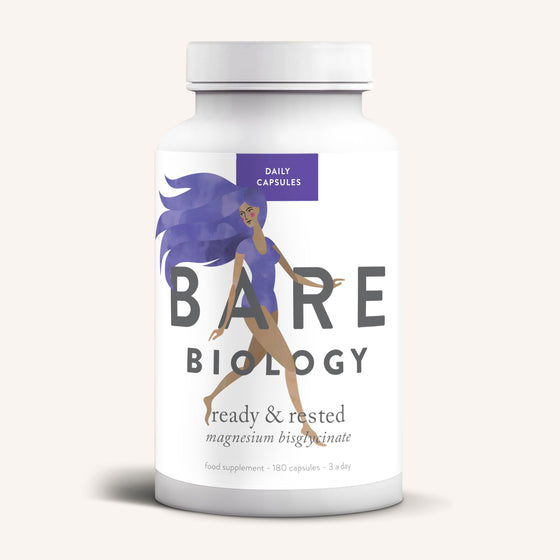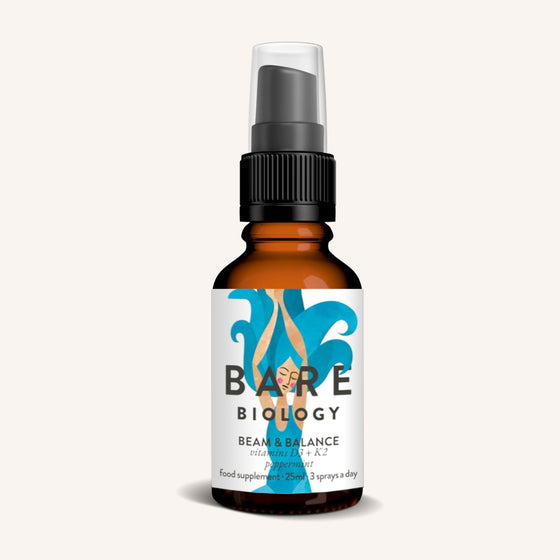I’m Megan Hallett, Nutritional Therapist and cookbook author, specialising in all things women’s health and hormones. Polycystic Ovarian Syndrome (PCOS) is one of the more common conditions I work with in the clinic. I have it myself and have seen first-hand just how receptive symptoms are to the right nutrition changes. I’ll be sharing my advice in this post…
What is PCOS and how to treat it?
What is PCOS?
Polycystic Ovarian Syndrome (PCOS) is a metabolic endocrine condition. Simply put, this means that both a hormonal and a metabolic element are at the heart of the condition. For many, dysregulated insulin is at the root and the thing driving hormonal symptoms, however, increased adrenal hormones and inflammation can also play a role.
PCOS symptoms
- Irregular cycles or missing periods
- Anovulation which can impact fertility
- Acne
- Hair loss on the head
- Hair growth on the face and body
- Low mood or anxiety
- Fatigue
- Difficulty losing weight or maintaining a healthy weight
How to treat PCOS?
As PCOS is a condition, it can’t be treated BUT the symptoms can be managed. Almost every symptom can be reversed with good nutrition, lifestyle and supplementation changes.
Medication is also an option. Whilst there is no shame in taking medication, the results are mostly temporary and may come with side effects. More often than not, lifestyle changes are more effective in reducing symptoms long-term.
Why is blood sugar balance important for PCOS?
Blood sugar dysregulation leads to an increase in the hormone insulin, which increases the production of androgens. An overproduction of insulin can make our cells resistant, a hallmark of PCOS. Androgens, such as testosterone and DHT, are behind unwanted symptoms such as hair growth on the face and can interrupt ovulation. High insulin can also lower a protein in the blood called SHBG, which makes testosterone more active in the body.
PCOS diet
An anti-inflammatory, low GI diet is very effective in managing PCOS. This means that most of what you eat is made up of whole foods, limiting processed foods, sugar and refined grains. Here are some ideas for your shopping list...
Protein: Make sure each meal is protein-dominant. This keeps you satiated throughout the day and helps to stabilise blood sugar levels.
- Grass-fed red meat
- Organ meats
- Grass-fed poultry
- Eggs
- Organic, fermented tofu and tempeh
- Organic greek yoghurt
Fibre: Next up, add your fibre source. It can get confusing here as fibre will also contain some carbohydrates. For this category, we are looking at the high fibre, low carb plants.
- Flaxseed
- Chia seeds
- Hemp hearts
- Berries
- Colourful, non-starchy veggies like carrots, peppers, peas, broccoli
- Dark leafy greens
Healthy Fats: Fat helps balance blood sugar and keeps us fuller for longer. It also supports healthy hormone synthesis. Make sure all meals contain a fat source. Here are some suggestions…
- Oily Fish, such as mackerel, sardines and salmon
- Avocado
- Extra virgin olive oil
- Grass-fed butter
- Coconut yoghurt
- Nuts and seeds
- Nut butter
Carbohydrates: Finally, add a low GI carbohydrate. Aim for whole carbohydrates such as sweet potatoes, legumes and whole grains over bread, pasta and pastries. Carbohydrates should never make up the bulk of your meal, rather they should be a small side.
- Sweet potatoes
- Lentils, beans, chickpeas
- Buckwheat, quinoa and black rice
- Seasonal fruit
Extras:
- Spearmint and nettle tea: help to down-regulate an enzyme called 5-alpha reductase, which makes testosterone more potent.
- Green tea: antioxidant-rich and supports metabolic health and energy levels.
- Fresh ginger: anti-inflammatory, easy to add to smoothies and tea.
- Turmeric: anti-inflammatory. Add black pepper or a fat source alongside.
- Ceylon cinnamon: helps with long-term blood sugar control.
- Apple cider vinegar: can be added to a small glass of water before meals to regulate blood glucose response.
Supplements for PCOS
When it comes to supplementation, the key is to keep things simple. Testing your levels and working with a knowledgeable professional is always the best way to approach supplementation.
Omega-3 is an essential nutrient found in oily fish. We can’t make it ourselves, so we have to eat it. Most of us aren’t getting enough. If you struggle to eat fish, a high-quality omega-3 supplement is important for your overall health. Bare Biology provides omega-3 test kits to help you find your omega-3 index before you start supplementation.
Vitamin D is another important nutrient that supports the immune system. Testing is recommended before supplementing with vitamin D to understand the right dose.
Inositol is a widely researched supplement and has been found as effective as metformin in some studies. A combination of myo-inositol, D-chiro inositol and folate can help to regulate insulin, and improve egg quality and fertility outcomes.
Magnesium in either its bisglycinate form or citrate form (the latter if you have sluggish bowels) is also effective at supporting insulin sensitivity, as well as regulating the nervous system and promoting restful sleep.
Zinc can down-regulate potent androgens. Androgens are a group of sex hormones including testosterone and DHT. We think of them as 'male' hormones but they play an important role in women's health too supporting reproduction and growth throughout the body.
Adaptogenic herbs such as reishi mushroom can help to regulate stress hormones.
A Methylated B complex could be worth a try if you struggle with fatigue, mood issues and sleep disturbances as B vitamins are needed for neurotransmitter synthesis.
The most drastic changes in symptoms I have witnessed with my clients are when the changes are consistent and easy to maintain long-term. Aim for progress rather than perfection, and don’t be afraid to ask for support.





